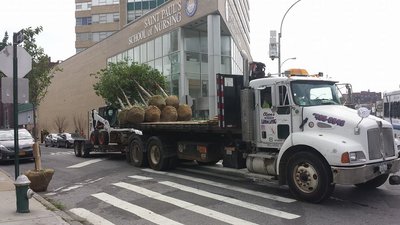The Parks Department is putting the “forest” in Forest Hills and the “park” in Rego Park with its plans to plant trees in both communities over the next year.
“Our goal is to continue expanding the city’s tree canopy as much as possible,” said spokesperson Charisse Hill. “Our fall 2021 planting projections for the Forest Hills and Rego Park communities are 128 trees, whereas our spring and fall 2022 planting projections for both communities total 425 trees.”
Stretches of Queens Boulevard, 66th Road, 102nd Street, and 67th Avenue are anticipated to have an estimated 16 to 19 additional trees by spring 2022.
Empty tree pits being reforested, while sidewalks are being excavated to accommodate new pits.
Extreme weather in recent years decimated the neighborhoods’ trees, which motivated residents to preserve mature trees and plant new ones, including the Forest Hills Tree Giveaway, which was held in MacDonald Park from 2011 to 2015.
“Young street trees are four times more likely to grow and thrive through tree stewardship, and community engagement can help ensure young street trees grow strong and healthy,” said Hill.
To volunteer to be a tree steward, visit nycgovparks.org/reg/stewardship.
Trees provide a home to wildlife, reduce stormwater runoff, filter and cool the air. Some older trees can feel like an unofficial landmark.
“As the steward of New York City’s urban forest, we take tree planting seriously,” said Hill “We recommend constituents who wish to help accelerate the planting process to pursue tree planting through New York Tree Time. The cost of planting a tree through this program is currently $1,800.”
To participate, email TreeTime@parks.nyc.gov or call (718) 361-8101.
A resident does not have to be a homeowner to play a role in the planting and maintenance of city trees. Residents can make note of empty tree pits, dead trees, or request pruning and planting by calling 311.
Over the years, the Parks Department has worked to diversify the street tree canopy.
“Species diversity is essential to maintaining a resilient, robust urban forest,” said Hill. “Planting a wider range of tree species helps combat pests and climate change. Our planting program now incorporates over 200 tree species in its street tree planting palette.”



